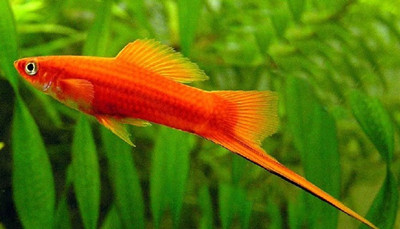Researcher Molly Cummings and her coworkers at the University of Texas at Austin placed afemale swordtail in a tank with two males visible at either end.
来自德克萨斯大学奥斯汀分校的研究员莫莉卡明斯和她的同事们做了一个有趣的实验。他们将一条雌性剑尾鱼放入一个水槽中,并在其两侧分别放入一条雄性剑尾鱼。
One of the males, however, wassurrounded by filtering glass that blocks UV light.
但是,不同的是,他们把其中一条雄性剑尾鱼用滤光玻璃给围起来,而紫外线是无法穿透这种玻璃的。
They found that the female was twice as likelyto demonstrate interest in the male whose UV flashers were visible to her.
结果,他们发现,这条雌性剑尾鱼对那条紫外线可见的雄性剑尾鱼的兴趣是另一条的两倍。
Twice as likely!That's a big finding.
两倍呀!这可是一个不小的发现!

Put a Mexican tetra in the middle tank–that's a predator who snacks on swordtails–and youget a different result.
之后,他们把会捕食剑尾鱼的墨西哥脂鲤取代雌鱼放入中间的水槽,结果截然不同。
The tetra shows equal interest in getting at both swordtails.
脂鲤对两条鱼表现出同等的兴趣。
Like humans,tetras are unable to register UV light.
因为它和人类一样,是无法用眼睛感知紫外线的。
Interpretation?
再解释一遍?
Male swordtails have developed a subtle way of advertising sexual readiness tofemales of their own species-while avoiding courting disaster.
简单说来,就是雄性剑尾鱼已经找到了一种精细的方法,在吸引同类雌性的同时避免招致被吃的厄运。













